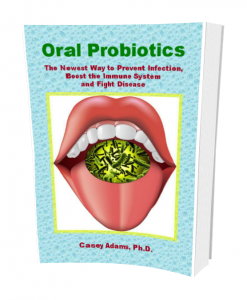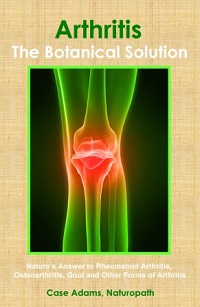Oral Probiotics Treat Oral Candida Infections

Oral Probiotics and Candida
Oral probiotics are powerful. They help protect our body from a range of bacteria and yeast infections.Now we find that oral probiotics will fend off Candida – one of the strongest yeast infections to humans.
Candida yeast species such as Candida albicans can easily infect an oral cavity whose defenses have been weakened. Brushing with a strong toothpaste or gargling with an antiseptic mouthwash might help, but only a little.
Candida species of yeasts have also become stronger over the years, especially with our increasing use of antiseptics. Not only are most antiseptics geared towards bacteria (“septic” or “sepsis” typically refers to bacterial infection), but yeast microorganisms eventually learn to counteract antiseptic mouthwashes and dentifrices.
Many species of Candida yeasts normally live in our guts and oral cavities. But when other microorganism species are weakened, these yeast species can grow out of control. Furthermore, stronger species of Candida yeasts can also invade our bodies and infect us.
Hospitals and other primary care facilities have become increasingly concerned with Candida. Doctors have found these species can become not just disease-causing when they infect patients. There have been deaths brought on or exacerbated by Candida infections in some cases.
So what is the answer? As I explain in depth in my book on the topic, it is better to fight fire with fire.
That is, to use friendly microorganisms to fight the unfriendly pathogens such as candida for territory. In the case of oral candida, the territory we are talking about is the oral cavity. Yes, our oral cavity is full of microorganisms including bacteria and yeast. One study found over 700 species of microorganisms in the mouth.
Oral Candida versus Oral Probiotics
This strategy was tested by researchers from Denmark’s University of Copenhagen, along with doctors from Sweden’s Halland Hospital. The physicians conducted a study of 215 people between the ages of 60 and 102 years old. The patients were living in nursing homes and were considered as frail.
They also were selected because they had oral candida infections.
The clinical trial was double-blinded and placebo controlled. The patients were divided into two groups. One was given one lozenge twice a day that had two species of oral probiotic bacteria in it. The other group was given a placebo lozenge.
The therapy lasted three months – or twelve weeks to be precise. The oral probiotic species given were two different species of Lactobacillus reuteri.
Both groups were tested at the beginning of the trial and at the end of the twelve weeks. The test consisted of Candida counts along with dental plaque and inflammation of the gums – the presence of gingivitis.
Candida counts lower among the oral probiotics group
After the twelve weeks, the oral candida counts in the probiotic group were significantly lower in the oral probiotic group. Meanwhile, the placebo group’s oral candida counts remained unchanged. Thus, the probiotic group had significantly lower candida counts compared to the placebo group.
The researchers concluded:
“Thus, daily use of probiotic lozenges may reduce the prevalence of high oral Candida counts in frail elderly nursing homes residents.”
Research on Candida infections and bacteria
Research from Japan’s Teikyo University Institute of Medical Mycology has determined that Streptococcus salivarius K12, an oral probiotic, inhibits the growth and colonization of Candida albicans.
The researchers tested the probiotic, Streptococcus salivarius K12 by first applying it to Candida albicans using a plate assay using fluorescence microscopy. The laboratory model was developed to match the environment of the oral cavity.
After applying the probiotic to the culture model, Streptococcus salivarius K12 inhibited the growth and development of the Candida yeast, not by directly acting as a fungicidal and killing the yeast, but by changing the yeast’s ability to adhere. When the Candida yeast cannot adhere, they cannot grow within a particular tissue system.
Following the laboratory testing, the researchers then tested the probiotic with mice that were infected with Candida albicans. Once again, they found that the S. salivarius K12 was able to stop the growth of the yeast infections.
Once again, the mechanism found was the probiotic’s ability to stop the yeasts from adhering to the mucosal membranes of the oral cavity. This inability to adhere allows the mucous membranes and immune system to remove the infective microorganisms before they can grow any larger.
Yeast infections are common
Yeast infections of Candida albicans are quite common, especially as we age. Menopausal women are often victims. Oral symptoms of Candida infections are called “thrush.” Yeast infections can start in the mouth and spread throughout the body if not controlled.
Oral probiotics are friendly bacteria that naturally reside in the oral cavity, sinuses and throat. They colonize these areas and help prevent infections of pathogenic bacteria, yeasts and viruses. Oral probiotic species and strains are different from intestinal probiotics, although a few species will live in both the intestines and the mouth.
Streptococcus salivarius is a typical oral probiotic colonizer among healthy persons. The S. salivarius K12 strain was cultured specifically for supplementation by Blis Technologies, Ltd. of New Zealand.
Further application
While elderly nursing home residents were the focus of this research, the application should also apply to practically anyone with oral candida. Candida species can infect virtually anyone at any time, especially when intakes of refined sugar are high.
This is because candida feed off of (or ferment) refined sugars. This can include fruits as well, because candida species feed on fructose along with sucrose.
Candida overgrowths can also occur following antibiotic treatment or antiseptic treatment. This can include dental treatments that apply antiseptics.
Oral infections of candida often indicate intestinal and genital infections of candida species. Probiotic strategies to eliminate those as well is supported by the research.
Garlic also fights Candida infections according to other research. Hopseed herb also fights Candida.
REFERENCES:
Kraft-Bodi E, Jørgensen MR, Keller MK, Kragelund C, Twetman S. Effect of Probiotic Bacteria on Oral Candida in Frail Elderly. J Dent Res. 2015 Sep;94(9 Suppl):181S-6S. doi: 10.1177/0022034515595950.
Ishijima SA, Hayama K, Burton JP, Reid G, Okada M, Matsushita Y, Abe S. Effect of Streptococcus salivarius K12 on the in vitro growth of Candida albicans and its protective effect in an oral candidiasis model. Appl Environ Microbiol. 2012 Apr;78(7):2190-9.
Adams C. Oral Probiotics: Fighting Tooth Decay, Periodontal Disease and Airway Infections Using Nature’s Friendly Bacteria. Logical Books, 2013, 2016.


















